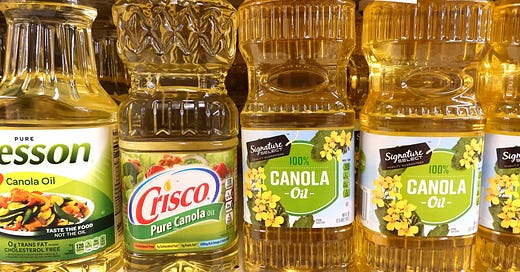Mr. Skeptical looks at the title and smirks, “Canola oil now? What’s the deal? It’s just another cooking oil, right?”
I shake my head. “Not quite. There’s a lot more to canola oil than meets the eye.”
LOCAL LOVE: RUSTY the dog. Yes, local love doesn’t just need to be a human. A dog can be part of local love, too. Rusty barks a lot is very energetic, and always wants to play. He’s also a thief. Whenever he comes into my room, he looks for socks. He’ll pick up and sneak out of my room with any sock I have lying around. It seems the smellier the sock, the more he goes after it.
Have you seen my post on why dogs should be in health care? Link here.
Subconscious Fat at 30,000 feet
Canola oil, widely marketed as a healthy cooking oil, has a history and health implications worth exploring. The oil originates from Canada, hence its name, Canola, which stands for “Canadian Oil, Low Acid.” It was developed in the 1970s by Canadian scientists through traditional crossbreeding of rapeseed plants to reduce the levels of erucic acid, a compound that can be toxic in large amounts.
Interestingly, rapeseed oil, the precursor to canola oil, played a significant role during World War II. It was used as a lubricant for steam engines in naval and merchant ships because it clung to wet metal surfaces, making it ideal for marine environments.
Mr. Skeptical raises an eyebrow. “So, they modified it to make it safer for consumption?”
“Yes. Canola oil is repurposed motor oil, and creating canola oil involves more than just plant breeding.”
Subconscious Fat at 10,000 feet
The production of canola oil involves a series of complex steps. The seeds are harvested and crushed to extract the oil. This crude oil undergoes refining, bleaching, and deodorizing to make it suitable for consumption. The refining process includes using solvents like hexane to extract the maximum oil from the seeds.
“Hexane? That doesn’t sound too healthy,” Mr. Skeptical comments.
“Indeed, it’s one of the many concerns. I googled “Is hexane harmful to humans?” And this is what it spit out:
Acute (short-term) inhalation exposure of humans to high levels of hexane causes mild central nervous system (CNS) effects, including dizziness, giddiness, slight nausea, and headache.
Canola oil is often promoted for its health benefits due to its low saturated fat content and high omega-3 and omega-6 fatty acids. However, the refining process reduces these beneficial properties. Additionally, the high temperatures used in processing can cause the formation of harmful trans fats, which are associated with numerous health issues, including heart disease, inflammation, and insulin resistance.
Subconscious Fat at Eye-Level
Mr. Skeptical asks, “I know trans fats are bad, but what’s the issue with the differences between the Omega-3s and Omega-6s?”
Our bodies need a balance of omega-3 and omega-6 fatty acids for optimal health. Omega-3s are anti-inflammatory, while omega-6s can promote inflammation. The typical Western diet, rich in processed foods and oils like canola oil, tends to be heavy on omega-6s and deficient in omega-3s, leading to chronic inflammation and associated diseases.
“Sounds like a recipe for disaster,” Mr. Skeptical remarks.
“Precisely. Chronic inflammation is linked to numerous health issues, including heart disease, diabetes, and even cancer.”
Moreover, most canola oil today comes from genetically modified (GM) crops. While the safety of GM foods is still a topic of debate, some studies suggest that they may have adverse effects on health and the environment.
“Alright, I get it. Canola oil isn’t as healthy as it’s made out to be. But what about cooking? Isn’t it good for high-heat cooking?” Mr. Skeptical asks.
“It’s commonly used for that, but better options exist.”
Practical Suggestions and Conclusions
While canola oil has a relatively high smoke point, which can be heated to high temperatures without breaking down, the refining process and the potential formation of trans fats make it less desirable. Remember, canola oil is repurposed motor oil that was used for battleships. Healthier alternatives for cooking at high heat include oils like butter, ghee, avocado oil, and coconut oil, which have higher smoke points and more stable fat compositions.
While many market canola oil as a healthy option, I’m here to tell you it’s not. When you have to process something so much to make it fit for human consumption, you’ve messed with Mother Nature.
Mr. Skeptical interrupts, “But it’s part of human nature that we want to innovate and improve things. It’s appealing not using animal fat to cook and instead a human-created product.”
“That doesn’t make it healthier. We can agree to disagree.”
He stands up and dramatically declares, “Well, I guess it’s time to start eating like a caveman and walking backward everywhere. If you see me bumping into walls, you know who to blame.”
Mr. Skeptical walks out but not backward. Believe him or me. It’s your decision if you want to continue consuming canola oil. Your choices have bigger consequences than you think.
Be aware.
PS Links in Facebook and Instagram. Full disclosure: Chat GPT was used to research and enhance this post.







Excellent article !!!- very informative!!!—no canola oil for my family—-I also loved to read about rusty—👏👏👏
I recently switched to avocado oil after seeing a video of how canola oil was made. I legitimately thought there was a canola plant.